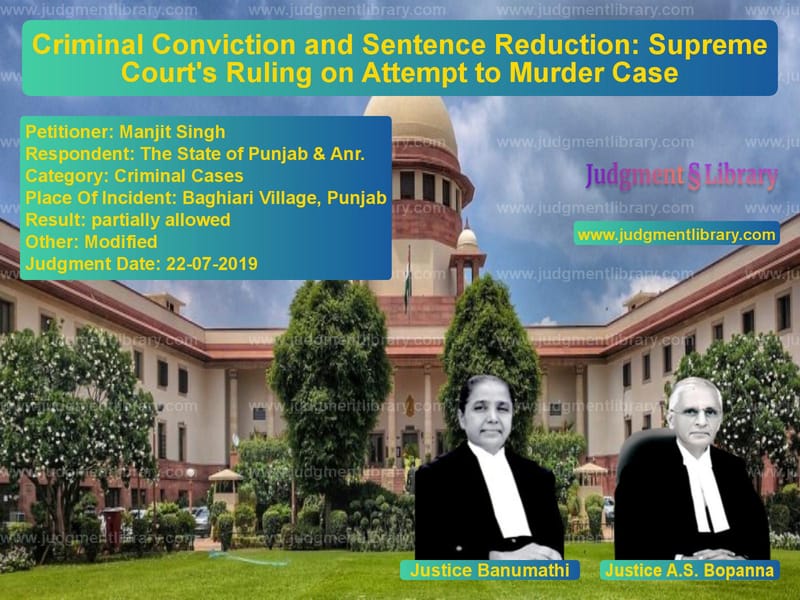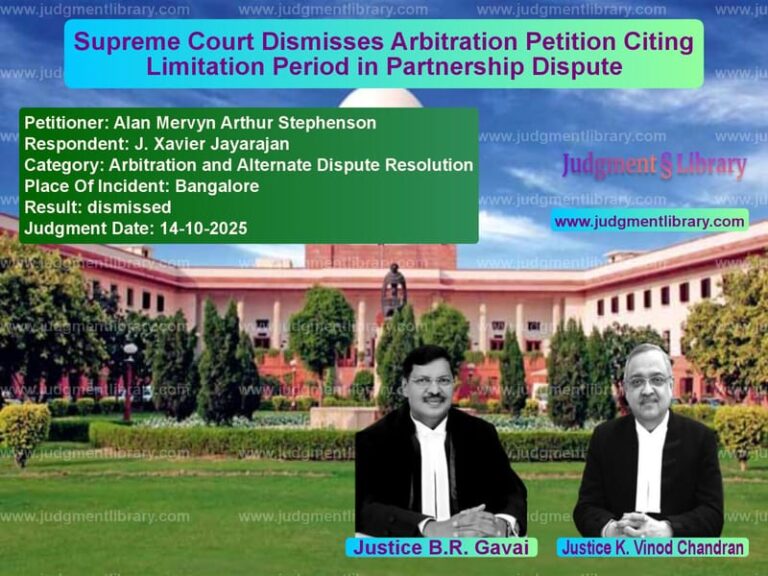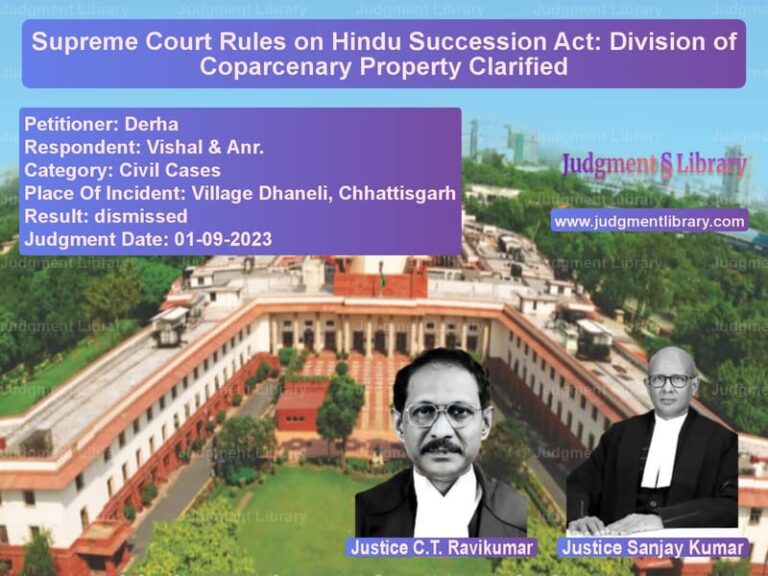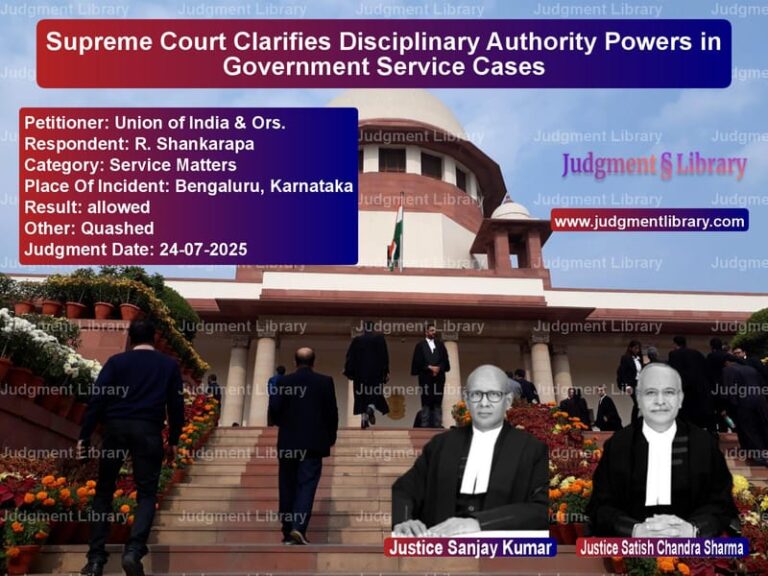Criminal Conviction and Sentence Reduction: Supreme Court’s Ruling on Attempt to Murder Case
The case of Manjit Singh v. The State of Punjab & Anr. highlights significant legal issues concerning criminal conviction, sentencing, and the role of compromise in non-compoundable offenses. The Supreme Court, while dealing with an appeal against conviction under Section 307 IPC (Attempt to Murder), addressed whether a compromise between the parties could influence sentencing.
Background of the Case
The prosecution’s case was that on 4 June 2001, at around 5:30 PM, the complainant, Hardip Singh (PW-1), was returning to his village, Baghiari, from a bus stop on his scooter when the appellant, Manjit Singh, and his brother, Ranjit Singh, attacked him. Both were allegedly armed with knives and inflicted injuries on the complainant’s left and right thighs.
Following the incident, a case was registered under Section 307 read with Section 34 IPC and Section 324 read with Section 34 IPC. The trial court found both accused guilty and sentenced them to five years of rigorous imprisonment along with a fine of Rs. 1,000 each under Section 307 IPC. Additionally, under Section 324 IPC, they were sentenced to two years of rigorous imprisonment. However, a third accused, Davinder Singh, was acquitted on the benefit of the doubt.
On appeal, the Punjab and Haryana High Court upheld the conviction and sentence of Manjit Singh but acquitted Ranjit Singh due to lack of sufficient evidence.
Petitioner’s Arguments
The appellant, Manjit Singh, challenged his conviction and sentence before the Supreme Court on the following grounds:
- During the pendency of the appeal, both parties had reached a compromise.
- A formal affidavit dated 15 July 2019 and a compromise deed dated 29 May 2019 were submitted before the Court, affirming the settlement between the appellant and the complainant.
- Since the complainant had forgiven the accused, a lenient view should be taken.
Respondent’s Arguments
The State of Punjab and the complainant contended:
- Section 307 IPC (Attempt to Murder) is a non-compoundable offense, and as per law, a compromise between the accused and the victim cannot automatically lead to acquittal.
- The lower courts had rightly convicted and sentenced the appellant based on the evidence.
- The Supreme Court should consider the gravity of the offense and uphold the punishment.
Supreme Court’s Observations
The Supreme Court analyzed whether a compromise in a non-compoundable offense could influence sentencing. It referred to the precedent set in Ishwar Singh v. State of Madhya Pradesh (2008) 15 SCC 667, where it was held that while compounding of a non-compoundable offense is not permitted, courts may consider the compromise while deciding on the quantum of punishment.
The Court noted:
- “It would not be appropriate to order compounding of an offense not compoundable under the Code ignoring and keeping aside statutory provisions.”
- “While imposing substantive sentence, the factum of compromise between the parties is indeed a relevant circumstance which the Court may keep in mind.”
Additionally, the Court considered the appellant’s submission that he had already served 17 months of imprisonment out of the total five-year sentence.
Final Judgment
In view of the compromise and the time already served by the appellant, the Supreme Court exercised its discretionary powers to reduce the sentence. The punishment of five years and two years of rigorous imprisonment under Sections 307 and 324 IPC, respectively, was reduced to the period already undergone by the appellant.
The Court ordered the immediate release of the appellant unless required in any other case. Additionally, it set aside the fine of Rs. 50,000 imposed by the High Court, directing that if the fine had already been paid, it should be refunded to the appellant.
The appeal was partly allowed, modifying the sentence accordingly.
Conclusion
This case establishes an important precedent regarding sentencing in non-compoundable offenses. While the Supreme Court reiterated that such offenses cannot be legally compounded, it acknowledged that courts may consider compromise agreements while determining the severity of punishment. The ruling balances legal principles with equitable considerations, ensuring that justice is served while taking into account the evolving nature of disputes and settlements.
Petitioner Name: Manjit Singh.Respondent Name: The State of Punjab & Anr..Judgment By: Justice Banumathi, Justice A.S. Bopanna.Place Of Incident: Baghiari Village, Punjab.Judgment Date: 22-07-2019.
Don’t miss out on the full details! Download the complete judgment in PDF format below and gain valuable insights instantly!
Download Judgment: Manjit Singh vs The State of Punjab Supreme Court of India Judgment Dated 22-07-2019.pdf
Direct Downlaod Judgment: Direct downlaod this Judgment
See all petitions in Attempt to Murder Cases
See all petitions in Bail and Anticipatory Bail
See all petitions in Judgment by R. Banumathi
See all petitions in Judgment by A. S. Bopanna
See all petitions in partially allowed
See all petitions in Modified
See all petitions in supreme court of India judgments July 2019
See all petitions in 2019 judgments
See all posts in Criminal Cases Category
See all allowed petitions in Criminal Cases Category
See all Dismissed petitions in Criminal Cases Category
See all partially allowed petitions in Criminal Cases Category







